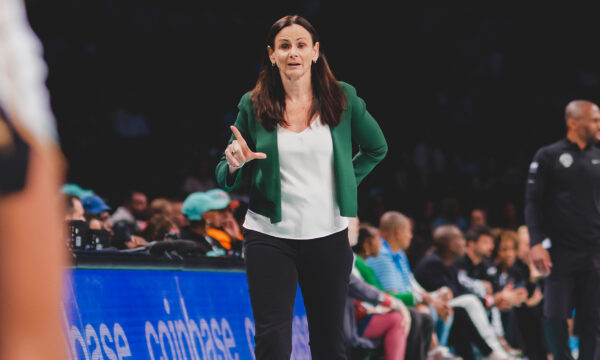
Erin Lydon, President of Poker Power.
How Playing Poker Can Help Women Succeed in the Workplace
Poker Power President Erin Lydon teaches women to go all in.
Want more M Dash?
Sign up for our weekly newsletter.
Thank you!
What do you picture when you picture a poker player? Let me guess: You’re imagining a man.
In fact, I’d be surprised if you weren’t. According to Erin Lydon, President of women’s empowerment company Poker Power, around 95% of professional poker players are men. Erin and her team are on a mission to change that: Their goal is to teach one million girls and women how to play poker—not for money, but to stack key leadership skills that accelerate success.
“It’s the game of poker, but it’s really the game of life,” says Erin. “We’ve figured out how to transcend the skills and strategies from the poker table to real life—from the classroom all the way to the boardroom. We’re teaching the women in our community to think and strategize and negotiate like a winning poker player.”
In theSkimm’s State of Women Report, March 2023, 74% of Millennial women agreed that “society treats women like second-class citizens” and that “the deck is stacked against women.” Further, 60% said that “People are generally not accepting of women advancing into positions of power.” According to Erin, learning how to harness the power of poker can help us start to change that. “Poker is a game of both logic and psychology, and what makes a really good poker player is reasoning combined with emotional intelligence,” she explains. “That’s something we, as women, can use to our advantage.”
Below, Erin shares how poker can help level the playing field, the biggest challenge women face in learning the game, how she defines success, and more.

On her early relationship with poker…
I wasn’t always a poker player. I began my finance career on Wall Street in 1999, a time when pay was secret and pregnancy was hidden. I was surrounded by poker, as most people in banking are, but I was never invited to take a seat at the poker table, and I certainly didn’t ask. As I’ve become an outspoken leader on equal pay and workplace equity over the last 20 years, I’ve realized that there’s a force field around the poker table, just as there’s a force field in the workplace, where most leadership roles are still held by men.
If you had asked me four years ago if I’d be running a poker company today, I would’ve laughed. I didn’t know how to play, and I believed a lot of the typical stereotypes about the game—that it’s a boys’ club, it’s gross, smoky basements, it’s places where I don’t belong and environments where I don’t feel comfortable. I’ve spent most of my career in male-dominated industries like banking, sports, and healthcare—and poker’s the worst. But it’s also the one where anyone can claim their seat.
On how teaching women poker can help level the playing field…
We’ve seen that when teenagers get the skills and strategies of poker into their hands—literally—they are better prepared for university. And even more importantly, when they step onto that first rung of the career ladder, they’re able to level the playing field. So many of their male colleagues have grown up being taught skills of risk-taking and negotiation that women don’t usually have the opportunity to learn.
We’re not trying to create professional poker players. We are taking the skills and the strategies of poker and translating them to your everyday life. However you define success, learning to think like a poker player is going to get you there faster.

On the biggest challenge women can overcome by learning to play poker…
Every person brings their own unique gifts and abilities and backgrounds to the game, and you can’t draw generalizations about women poker players. That said, we have now introduced over 30,000 women to this game, and what I see more often than not is that no matter where they are in their career journey, the women we teach become hesitant around risk.
What often happens is that we’ll come to the part of the game where the player should go all in, but instead of risking it all, she’ll say, “Okay, I’ll do it, but can I just keep back six chips?” That’s exactly the behavior that we are trying to change with poker—the mindset of, “I need my rainy day fund” and “I can’t actually risk it all.” I’ve now played poker with countless men, and never once have I seen them hesitate in that way; they’re either all in, or they’re folding the hand.
Risk-taking is a skill that we feel really strongly about. It translates to how you go about asking for a promotion; to having the courage to negotiate your pay; and even to negotiating with your partner about whose turn it is to take the trash out. There are so many elements of your life where getting comfortable with risk is going to help accelerate success.
On the role of emotional intelligence…
Poker is a game of both logic and psychology, and what makes a really good poker player is reasoning combined with emotional intelligence. That’s something we, as women, can use to our advantage. By and large, women are good at reading people and are often noted as being more empathetic and better able to listen and care. Those qualities are rewarded at the poker table.
When you play poker, you don’t have to be the tallest or the strongest or the loudest person in the room. All you have to do is use your mind, and that’s an incredibly empowering thing for a woman who maybe spends most of her day not in a position of strength. Depending on her relationships and where her workplace is, she may not feel like she’s in that leadership seat. That changes at the poker table.
Unlike any other casino game where you’re playing the house, poker is played against other opponents. So if you can bring your ability to read other players, notice their tells, and sense their patterns of play, you’ll be a powerful player. At the poker table, men typically underestimate women, and you can use that to your advantage. They assume you’re not going to bluff big, that you’re not going to make a big raise, and that you’re certainly not going to go all in before the river. A woman who’s showing aggressive technique and is also able to be highly perceptive at the table—that’s the winning combination.

On how women at all career levels are harnessing the power of poker…
One of our earliest interns learned poker with us and really took to the game. She then used that experience to write her college essay. When a girl can write, “I play poker,” as an opening line on her college application, it’s a real distinguisher, because there are so many stereotypes about this game. Immediately, you think, “Oh, she must be really smart and good at math. She’s probably really brave and confident.” That’s a huge win for the young women in our community.
We also work with leadership teams and CEOs, and as you’d guess, these are women who have done a lot of things right in their careers. But even at that level, we still see imposter syndrome, and we still see hesitation around being aggressive at the poker table. We still see people being modest when they win. When you win that pot, we want you screaming and clapping, because being overly humble in your accomplishments can detract from your career acceleration. Practicing some of those less obvious skills as a senior leader at the poker table enables you to take them to the boardroom.
On what success means to her today…
I am all in with this company. I have worked for many, many years to find a way to empower women in the workplace, and I truly believe this is it. I know that as we grow, we will continue to have more women join our community and more brand awareness. Those are all the metrics that matter from the business standpoint, but I also think it’s really important, as a leader, to focus not only on the brand and the product, but also on turning your attention inward. I care a lot about our core team—they are the heartbeat of Poker Power. If they are thriving, I know that our community is going to thrive. So for me as a leader, my feeling of success comes from my team’s success.
Want to learn more? Join us for a workshop with Poker Power at our Chicago store, presented in partnership with theSkimm, on 9/26. Reserve your spot here.










